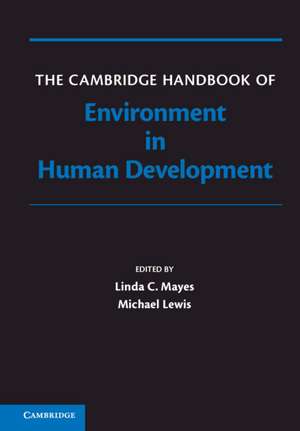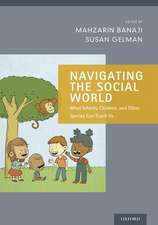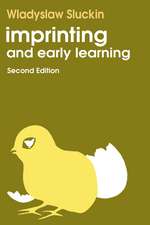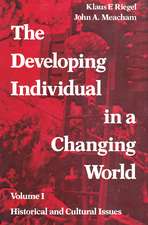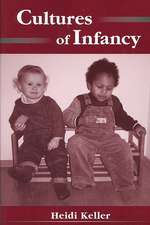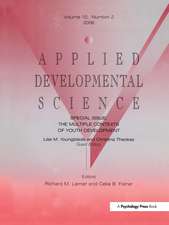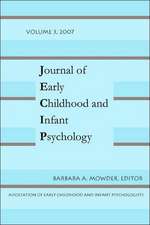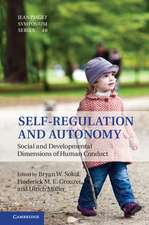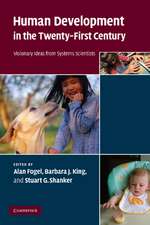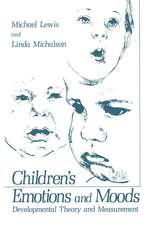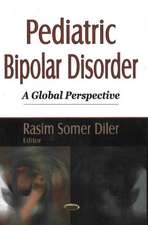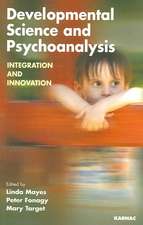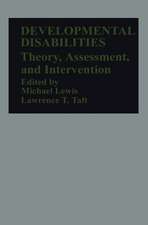The Cambridge Handbook of Environment in Human Development: Cambridge Handbooks in Psychology
Editat de Linda Mayes, Michael Lewisen Limba Engleză Hardback – 26 aug 2012
| Toate formatele și edițiile | Preț | Express |
|---|---|---|
| Paperback (1) | 272.35 lei 3-5 săpt. | +60.64 lei 7-13 zile |
| Cambridge University Press – iul 2015 | 272.35 lei 3-5 săpt. | +60.64 lei 7-13 zile |
| Hardback (1) | 1027.56 lei 6-8 săpt. | |
| Cambridge University Press – 26 aug 2012 | 1027.56 lei 6-8 săpt. |
Din seria Cambridge Handbooks in Psychology
- 23%
 Preț: 1254.71 lei
Preț: 1254.71 lei - 11%
 Preț: 449.49 lei
Preț: 449.49 lei -
 Preț: 502.52 lei
Preț: 502.52 lei -
 Preț: 501.96 lei
Preț: 501.96 lei - 8%
 Preț: 426.60 lei
Preț: 426.60 lei -
 Preț: 486.56 lei
Preț: 486.56 lei - 5%
 Preț: 441.42 lei
Preț: 441.42 lei - 9%
 Preț: 1282.44 lei
Preț: 1282.44 lei -
 Preț: 494.25 lei
Preț: 494.25 lei - 8%
 Preț: 429.69 lei
Preț: 429.69 lei - 5%
 Preț: 397.85 lei
Preț: 397.85 lei - 23%
 Preț: 1246.12 lei
Preț: 1246.12 lei - 5%
 Preț: 439.60 lei
Preț: 439.60 lei - 19%
 Preț: 491.54 lei
Preț: 491.54 lei - 5%
 Preț: 718.49 lei
Preț: 718.49 lei -
 Preț: 511.59 lei
Preț: 511.59 lei - 8%
 Preț: 426.60 lei
Preț: 426.60 lei - 8%
 Preț: 427.05 lei
Preț: 427.05 lei - 8%
 Preț: 425.42 lei
Preț: 425.42 lei -
 Preț: 411.92 lei
Preț: 411.92 lei -
 Preț: 272.35 lei
Preț: 272.35 lei - 8%
 Preț: 425.42 lei
Preț: 425.42 lei - 9%
 Preț: 594.29 lei
Preț: 594.29 lei -
 Preț: 511.21 lei
Preț: 511.21 lei - 23%
 Preț: 1248.79 lei
Preț: 1248.79 lei -
 Preț: 370.88 lei
Preț: 370.88 lei - 8%
 Preț: 424.41 lei
Preț: 424.41 lei -
 Preț: 374.90 lei
Preț: 374.90 lei - 8%
 Preț: 427.49 lei
Preț: 427.49 lei -
 Preț: 511.59 lei
Preț: 511.59 lei - 5%
 Preț: 1538.86 lei
Preț: 1538.86 lei - 23%
 Preț: 2195.06 lei
Preț: 2195.06 lei - 23%
 Preț: 1168.35 lei
Preț: 1168.35 lei - 8%
 Preț: 428.36 lei
Preț: 428.36 lei -
 Preț: 488.47 lei
Preț: 488.47 lei - 8%
 Preț: 420.13 lei
Preț: 420.13 lei - 9%
 Preț: 850.12 lei
Preț: 850.12 lei - 8%
 Preț: 430.05 lei
Preț: 430.05 lei -
 Preț: 497.35 lei
Preț: 497.35 lei -
 Preț: 283.03 lei
Preț: 283.03 lei
Preț: 1027.56 lei
Preț vechi: 1194.84 lei
-14% Nou
Puncte Express: 1541
Preț estimativ în valută:
196.65€ • 204.55$ • 162.34£
196.65€ • 204.55$ • 162.34£
Carte tipărită la comandă
Livrare economică 12-26 aprilie
Preluare comenzi: 021 569.72.76
Specificații
ISBN-13: 9780521868822
ISBN-10: 0521868823
Pagini: 744
Ilustrații: 26 b/w illus. 8 tables
Dimensiuni: 184 x 260 x 35 mm
Greutate: 1.43 kg
Ediția:New.
Editura: Cambridge University Press
Colecția Cambridge University Press
Seria Cambridge Handbooks in Psychology
Locul publicării:Cambridge, United Kingdom
ISBN-10: 0521868823
Pagini: 744
Ilustrații: 26 b/w illus. 8 tables
Dimensiuni: 184 x 260 x 35 mm
Greutate: 1.43 kg
Ediția:New.
Editura: Cambridge University Press
Colecția Cambridge University Press
Seria Cambridge Handbooks in Psychology
Locul publicării:Cambridge, United Kingdom
Cuprins
Introduction Linda Mayes and Michael Lewis; 1. Proximal to distal environments in child development: theoretical, structural, methodological, and empirical considerations Marc Bornstein; 2. Risk and adversity in developmental psychology Jelena Obradovic, Anne Shaffer and Anne Masten; 3. Maternal care as the central environmental variable Lynne Murray and Marc de Rosnay; 4. Novel assessment techniques aimed at identifying proximal and distal environmental risk factors for children and adolescents Linda Mayes, Stacey P. Daughters and Jessica M. Richards; 5. Beyond the Dyad Michael Lewis; 6. Social agents and genes: comments on the ontogenesis of the 'social genome' Elena Grigorenko and Sarah Ward; 7. The dynamic systems perspective: what is the system? Tom Hollenstein; 8. New approaches to the notion of 'environmental risk' Jeanne Brooks-Gunn, Aliza W. Pressman and Pamela Klebanov; 9. Environment across time Ronald Seifer; 10. Parental care and attachment Peter Fonagy and Michelle Sleed; 11. Understanding the developmental influences of the family environment Sharon Landesman Ramey and Craig T. Ramey; 12. Measuring the environments of early care, education, and intervention programs for children in poverty William Gilliam and Laura Stout Sosinsky; 13. School influences on human development Jacquelynne Eccles and Robert W. Roeser; 14. Siblings and peers in the adult-child-child triadic context Sybil L. Hart; 15. Neighborhood environments: a multi-measure, multi-level approach Ross D. Parke, Shoon Lio, Thomas J. Schofield, Louis Tuthill, Eric Vega and Scott Coltrane; 16. Rural versus urban environments Robert H. Bradley; 17. Current research and new dimensions Stephanie M. Jones, Monica Yudron, Aeliecia Pisciella and Hadas Eidelman; 18. Social networks Mary J. Levitt; 19. Marital health E. Mark Cummings and Lauren M. Papp; 20. Parental psychopathology: a developmental perspective on mechanisms of transmission Nancy E. Suchman and Cindy DeCoste; 21. Early exposure to trauma: domestic and community violence Alicia Lieberman and Patricia Van Horn; 22. Child maltreatment: a pathogenic relational environment across development Julia Kim-Cohen, Sarah Rabbitt, Jessica Henry and Andrea L. Gold; 23. The cultural organization of children's environment Sara Harkness and Charles M. Super; 24. Children and electronic media Sandra L. Calvert; 25. Parenting behavior as the environment where children grow Ruth Feldman; 26. HOME inventory Robert H. Bradley; 27. Measurement and model building in studying the influence of socioeconomic status on child development Erika Hoff, Brett Laursen and Kelly Bridges; 28. Assessment of parental psychopathology and adaptive functioning Thomas Achenbach; 29. Assessment of social support, social network, and social capital Brenda K. Bryant; 30. Stress reactivity in child development research: indices, correlates, and future directions Jelena Obradovic and W. Thomas Boyce; 31. Mixed model analyses for repeated-measures data Peter J. Molfese, Yaacov Petscher and David L. Molfese.
Recenzii
'This book will be a force for good.' John Goodier, Reference Reviews
Descriere
This volume takes the child's environment (culture, education, family, peers and media) as an essential component of child development.
